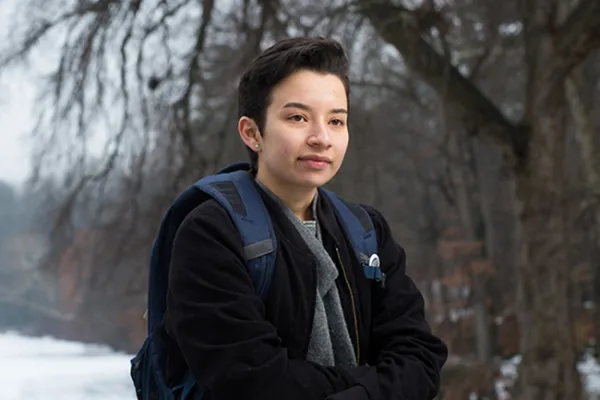One Student: A Life in Limbo
Campus Life

Published February 26, 2018
Originally from El Salvador, Diana Umana ’19 and her family have been able to live in the United States without fear of deportation thanks to an alphabet soup of government programs: DACA, or Deferred Action for Childhood Arrivals, for Umana, and TPS, or temporary protected status, for her parents. But all of that changed after the Trump administration terminated DACA in September 2017, upending the lives of Umana and 800,000 other “Dreamers”; in January, the administration ended the protected status of 200,000 Salvadorans, including Umana’s parents. Congress could still intervene on behalf of DACA recipients and longtime TPS holders, but in the meantime, Umana faces an uncertain future.
MY FAMILY LEFT EL SALVADOR because there had been a civil war, and my parents were given TPS because of an earthquake there. The earthquake and the civil war made it really economically difficult for them. They both had college degrees—my dad had a degree in agronomy, and my mom was a nurse—but they still couldn’t find good, high-paying jobs for them to support me and my sisters. They figured that if they came to the U.S., we could get degrees here and have better jobs.
I CAME TO THE UNITED STATES when I was 4. I grew up in Athens, Georgia. I liked it in Georgia, and I wanted to go to college there. But I realized that was going to be hard for me to do because the state board of regents made a policy that undocumented students couldn’t apply to the top universities in Georgia. I worked really hard to have good grades, and then I applied to a bunch of out-of-state schools. That’s how I got to Smith.
I’M A PHILOSOPHY MAJOR and government minor. Graduating from Smith will mean a lot, even if I don’t have legal status. The international dean [Caitlin Szymkowicz] offered me support for paying for my DACA renewal application—$500 every two years. Smith has helped me with that. And the student group OUSR [Organizing for Undocumented Students’ Rights] has been a huge support for me.
COMING OUT AS UNDOCUMENTED is a big decision to make. It’s pretty scary. You never know how people are going to react, and that causes a lot of anxiety. For me, it was about weighing the positive outcomes: I could meet other undocumented people and raise awareness. Now, if something were to happen to me, I’d have support.
DEPORTATION IS HAPPENING to so many people around me, but I’m not the one being targeted. I have the privilege of being a young female college student. It’s a certain kind of person that they target: workers, men, heads of families. Darker-skinned people. Heavy accents. It’s horrible, because there’s no reason for them to be targeted. They’re just trying to provide for their families.
I HAD CONSIDERED APPLYING to law school after Smith, but I’m not so sure about that anymore because of losing DACA. I don’t want to waste my parents’ money on an advanced degree if it’s not going to amount to anything. I could try to apply for an H-1B visa and get an employer to sponsor me, but that would mean going back to El Salvador, applying there and then risking it not working out.
EVERY DAY SOMETHING UPSETTING happens because of the Trump administration. It’s like we’re moving back in time, because we’ve slowly made progress on a lot of things and this is reversing that. Activism helps keep me positive. Being involved in things like OUSR, where I’m among a larger community, feels powerful and like I’m contributing to something good.